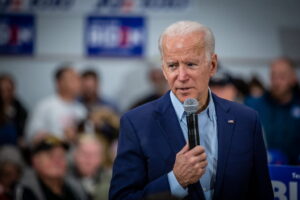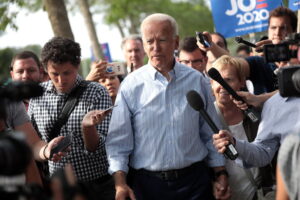Tag: 2020 Election
Election of 2020: Current Standings for Candidates
by The Cowl Editor on January 16, 2020
National and Global News

by Alexandra Huzyk ’20
News Staff
The next United States presidential elections are scheduled to take place on Nov. 3, prompting voters to consider a number of diverse candidates. As of January 2020, there are 12 major Democratic candidates, and three major Republican candidates, including incumbent President Donald Trump.
The eighth, ninth, and tenth Democratic primary debates are scheduled to take place throughout February. These debates help to inform voters, promote accountability of elected officials, and progressively narrow down the number of candidates running for the Democratic nomination. Past debates have pressed candidates to address important issues like healthcare, education, gun violence, inequality, and war. The Democratic primary will likely be settled on Super Tuesday—March 3, 2020—“when the largest number of states and territories hold a presidential preference primary or caucus.”
Front-runners for the Democratic nomination currently include Joe Biden, Bernie Sanders, Pete Buttigieg, Elizabeth Warren, and Amy Klobuchar. Many predict Biden will be the nominee for the Democratic Party; having maintained consistently strong African-American support, continuing to receive a multitude of endorsements, and polling the best against President Trump. According to political Analyst Nate Silver, “Should Joe Biden win Iowa, he has an 80 percent chance of becoming the nominee.”
In the wake of these predictions, Sanders has gained momentum within the past months, receiving $34.5 million in the last fundraising quarter and garnering strong support from younger generations and public sector union members. However, Sanders’ democratic socialist views pose an issue for Democrats who think a more politically moderate candidate has a greater chance of winning against President Trump. In addition, many view Sanders’ age (77) and health as potentially problematic.
In the opposing party, candidates who seek to attain the Republican nomination include incumbent President Donald Trump, Joe Walsh, and William F. Weld. Even after having been recently impeached, for abuse of power and obstruction of Congress, President Donald Trump remains the primary Republican presidential candidate. The chances of either Walsh or Weld being granted this nomination are extremely low.
Although presidential approval ratings of Trump have remained notoriously low throughout his time in office, it is reported that he has around a 40% chance of being reelected to office. These chances of reelection may be explained by the decreasing unemployment rate and increasing GDP growth rates, which some attribute to the work of Trump’s presidency.
Historically, 17 of 44 presidents have been reelected for a second term. On the power of incumbency, Aaron David Miller, an academic at the Carnegie Endowment for International Peace, has said, “As President Trump has demonstrated with frightening clarity, presidents dominate the national and media narratives; we see or hear them daily, in Trump’s case often hourly.”
A number of different factors will continue to influence the likelihood of Trump’s reelection, including the upcoming impeachment trial in the Senate and the recently initiated military conflict with Iran.
Bursting the PC Bubble: Democratic National Debates for Presidential Candidacy Begin
by The Cowl Editor on September 19, 2019
National and Global News

by Eileen Cooney ’23
News Staff
On Sept. 12, the third round of the Democratic National Debates kicked off. It has been over a month since the candidates faced each other on stage in the last Democratic National Debate, and since then the number of candidates running has shrunk considerably. In the July debates, which spanned over two nights, there were twenty candidates, and in the September debates that number was down to ten candidates.
Going into the night, all eyes were on former Vice President Joe Biden, Vermont Senator Bernie Sanders, and Massachusetts Senator Elizabeth Warren, as many believe they are the frontrunners in the race for the presidency.
Many believe that Biden was the clear winner over Sanders and Warren, having a solid performance for the first thirty minutes, which is significant because this time block typically has the highest viewership.
Although he stumbled a bit later into the night, particularly when faced with questions about race and historically black colleges, and weathered attacks from other candidates including those from former San Antonio mayor Julian Castro about his age and memory, Biden appeared to be a strong and able candidate overall.
High expectations surrounded Elizabeth Warren and her face-off with Biden, but many were disappointed in her performance, particularly within the first hour of the debate where she did not participate as much as hoped.
Warren provided solid answers when questioned about education policy and public school funding, and she also championed her “Medicare For All” healthcare plan, but some of her policies remain unpopular, as she has not indicated how she is going to directly implement or fund them.
Both Warren and Sanders faced attacks on the “Medicare for All” plans by Senator Amy Klobuchar, who, when asked to speak on the topic, claimed, “I don’t think that’s a bold idea. It’s a bad idea.” This was not the only hit that Senator Sanders took. He faced criticisms from candidates who compared his idea of socialism to Venezuelan socialism, which is not a favorable comparison as political unrest plagues Venezuela.
Former congressman Beto O’Rourke shined when asked about his stance on gun-control. The crowd erupted in applause when he said, “Hell yes we are going to take your AR-15.”
O’Rourke has continued to call for stricter gun control and for a ban on AR-15 assault-style weapons, especially following the mass shooting at a Walmart in his hometown of El Paso, Texas.
Cory Booker also had repeatedly called for plans to end systematic racism and for criminal justice reform, allowing him to remain popular among voters.
Andrew Yang, who has surprised many by staying relevant in this race, stuck to his promises of giving every American adult over the age of 18 “Freedom Dividends,” or $1000 a month. Yang’s statements elicited chuckles from Senator Kamala Harris and Mayor Peter Buttigieg of South Bend, Indiana.
Senator Harris stuck to her strategy of attacking President Donald Trump, mentioning him directly by name numerous times. The publicity she gained from her attacks on Biden for working with segregationist senators in the 1970s back in July seems to have worn off, and her complicated, ambiguous health care plan remains unpopular among some voters.
Castro also faced backlash for his attacks on Biden’s age and memory, repeatedly asking Biden, “Are you forgetting what you said two minutes ago?”
Castro claimed that his remarks were not an attack on the former Vice President’s age or memory, but an attack on their disagreement over healthcare policy.
Mayor Buttigieg made political history by being the first person from the LGTBQ community to talk about coming out as a presidential candidate.
He did so in his powerful closing statements where he talked about being a gay man serving in the military under the “Don’t Ask, Don’t Tell Policy” and being a gay man running for president. These powerful statements evoked enormous applause from the audience.
After the debates, Biden still lead the polls, followed by Sanders, Warren, and Harris.
